Related Research Articles

A jury trial, or trial by jury, is a legal proceeding in which a jury makes a decision or findings of fact. It is distinguished from a bench trial, in which a judge or panel of judges makes all decisions.

Sidney James was a South African–British actor and comedian whose career encompassed radio, television, stage and screen. Noted for his distinctive dirty laugh, he was best known for numerous roles in the Carry On film series.
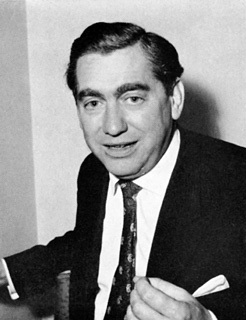
Anthony John Hancock was an English comedian and actor.
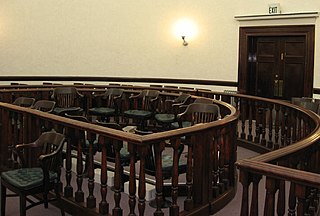
A jury is a sworn body of people (jurors) convened to hear evidence, make findings of fact, and render an impartial verdict officially submitted to them by a court, or to set a penalty or judgment. Most trial juries are "petit juries", and usually consist of twelve people. A larger jury known as a grand jury has been used to investigate potential crimes and render indictments against suspects.
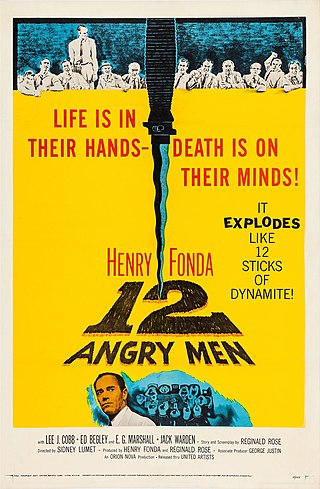
12 Angry Men is a 1957 American legal drama film directed by Sidney Lumet in his feature directorial debut, adapted by Reginald Rose from his 1954 teleplay. A critique of the American jury system during the McCarthy Era, the film tells the story of a jury of twelve men as they deliberate the conviction or acquittal of a teenager charged with murder on the basis of reasonable doubt; disagreement and conflict among the jurors forces them to question their morals and values. It stars an ensemble cast, featuring Henry Fonda, Lee J. Cobb, Ed Begley, E. G. Marshall, and Jack Warden.
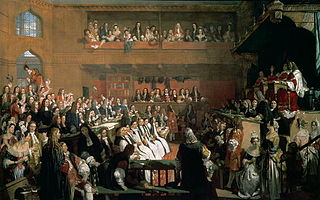
Jury nullification, also known in the United Kingdom as jury equity, or a perverse verdict, is when the jury in a criminal trial gives a verdict of not guilty even though they think a defendant has broken the law. The jury's reasons may include the belief that the law itself is unjust, that the prosecutor has misapplied the law in the defendant's case, that the punishment for breaking the law is too harsh, or general frustrations with the criminal justice system. It has also been commonly used to oppose what jurors perceive as unjust laws, such as those that once penalized runaway slaves under the Fugitive Slave Act, prohibited alcohol during Prohibition, or criminalized draft evasion during the Vietnam War. Some juries have also refused to convict due to their own prejudices in favor of the defendant. Such verdicts are possible because a jury has an absolute right to return any verdict it chooses. Nullification is not an official part of criminal procedure, but is the logical consequence of two rules governing the systems in which it exists:
- Jurors cannot be punished for passing an incorrect verdict.
- In many jurisdictions, a defendant who is acquitted cannot be tried a second time for the same offense.
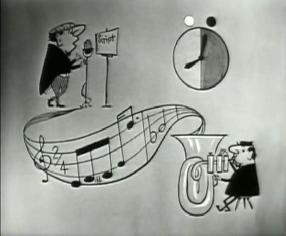
Hancock's Half Hour was a BBC radio comedy, and later television comedy series, broadcast from 1954 to 1961 and written by Ray Galton and Alan Simpson. The radio series starred Tony Hancock, with Sidney James, Bill Kerr and,at various times, Moira Lister, Andrée Melly, Hattie Jacques, and Kenneth Williams. The television series also featured Sidney James with regular appearances from John Le Mesurier, Hugh Lloyd, Warren Mitchell, Liz Fraser and Patricia Hayes. In the final television series, renamed simply Hancock, the supporting cast included established actors such as Jack Watling and Patrick Cargill.
Not proven is a verdict available to a court of law in Scotland. Under Scots law, a criminal trial may end in one of three verdicts, one of conviction ("guilty") and two of acquittal.

Verdict of Twelve is a novel by Raymond Postgate first published in 1940 about a trial by jury seen through the eyes of each of the twelve jurors as they listen to the evidence and try to reach a unanimous verdict of either "Guilty" or "Not guilty". Verdict of Twelve is set in England in the late 1930s. Up to the final pages of the novel, till after the trial is over, the reader does not know if the defendant—a middle-aged woman charged with murder—is innocent or not.

The Jury is a British television serial broadcast in 2002. The series was the first ever to be allowed to film inside the historic Old Bailey courthouse.
Citizen James is a BBC sitcom that ran for three series between 24 November 1960 and 23 November 1962. The show featured comedian and actor Sid James and Sydney Tafler with Bill Kerr and Liz Fraser appearing in early episodes. It was initially written by the comedy writing team of Galton and Simpson, who based the characters very much on the "Sidney Balmoral James" and "William Montmorency Beaumont Kerr" roles that they had played in Hancock's Half Hour.
"One Angry Veronica" is the tenth episode of the second season of the American mystery television series Veronica Mars, and the thirty-second episode overall. Written by Russell Smith and directed by John T. Kretchmer, the episode premiered on UPN on December 7, 2005.

The Verdict is a 2007 BBC television programme produced by RDF Media in which twelve celebrities form the jury in the trial of a fictional rape case. The programme was filmed with real legal and medical professionals, but with actors playing the victim, defendants, and witnesses. The jury considered their verdict in front of cameras.

12 Angry Men is a 1997 American made-for-television drama film directed by William Friedkin, adapted by Reginald Rose from his original 1954 teleplay of the same title. It is a remake of the 1957 film of the same name. The film aired on August 17, 1997 on Showtime.

Ek Ruka Hua Faisla is a 1986 Indian Hindi-language legal drama film directed by Basu Chatterjee. It is a remake of the Golden Bear winning American motion picture 12 Angry Men (1957) directed by Sidney Lumet, which was an adaptation from a 1954 teleplay of the same name by Reginald Rose.

Twelve Angry Men is a play by Reginald Rose adapted from his 1954 teleplay of the same title for the CBS Studio One anthology television series. Staged first in San Francisco in 1955, the Broadway debut came 50 years after CBS aired the play, on October 28, 2004, by the Roundabout Theatre Company at the American Airlines Theatre, where it ran for 328 performances.

The court of assizes is the trial court which tries the most serious crimes in the judicial system of Belgium. It is the highest Belgian court with criminal jurisdiction; as such, it is the only Belgian court that can sentence someone to life imprisonment. The courts of assizes are not permanent courts; a new court of assizes is assembled for each new trial. There is a court of assizes in each of the ten provinces of Belgium, as well as one in the arrondissement of Brussels-Capital which is not part of any province. Further below, an overview is provided of the eleven courts of assizes and their seats. They are the only courts in Belgium for which the provinces are used as territorial subdivisions. They are also the only courts in Belgium that hold jury trials. The jury acts as sole trier of fact, but decides on the penalty together with the judges. The trial by jury of certain crimes is laid down in article 150 of the Belgian Constitution. The Belgian courts of assizes have the same origin as their French namesakes.
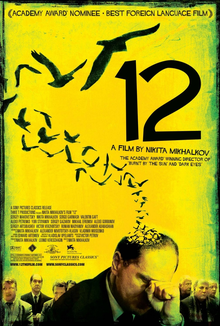
12 is a 2007 Russian legal drama film by director, screenwriter, producer and actor Nikita Mikhalkov. The film is a Russian-language remake of Sidney Lumet's 1957 film 12 Angry Men, which in turn was based on Reginald Rose's 1955 stage play, Twelve Angry Men, itself based on Rose's 1954 teleplay of the latter's same name.
Twelve Angry Men is an American courtroom drama written by Reginald Rose concerning the jury of a homicide trial. It was broadcast initially as a television play in 1954. The following year it was adapted for the stage. It was adapted for a film of the same name, directed by Sidney Lumet, and released in 1957. Since then it has been given numerous remakes, adaptations, and tributes
"Twelve Angry Men" is a 1954 teleplay directed by Franklin J. Schaffner and written by Reginald Rose for the American anthology television series Studio One. It follows the titular twelve members of a jury as they deliberate a supposedly clear-cut murder trial, and details the tension among them when one juror argues that the defendant might not be guilty. Initially staged as a CBS live production on September 20, 1954, the drama was later rewritten for the stage in 1955 under the same title, and as a feature film in 1957 titled 12 Angry Men. The episode garnered three Emmy Awards for writer Rose, director Schaffner, and Robert Cummings as Best Actor.
References
- ↑ "Twelve Angry Men (1959)". Archived from the original on 12 December 2017.
- ↑ "12 Angry Men (1957) - Sidney Lumet - Synopsis, Characteristics, Moods, Themes and Related - AllMovie". AllMovie.
- ↑ "Last night's viewing - My Hero: Ben Miller on Tony Hancock BBC1", The Independent, 28 August 2013
- ↑ "Twelve Angry Men (1996)". Archived from the original on 20 February 2018.